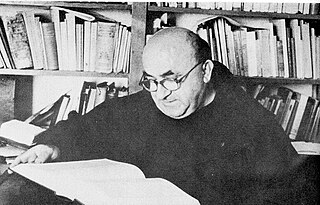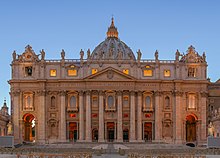
Pope Pius IV, born Giovanni Angelo Medici, was head of the Catholic Church and ruler of the Papal States from 25 December 1559 to his death in December 1565. Born in Milan, his family considered itself a branch of the House of Medici and used the same coat of arms. Although modern historians have found no proof of this connection, the Medici of Florence recognized the claims of the Medici of Milan in the early 16th century.
The Roman Curia comprises the administrative institutions of the Holy See and the central body through which the affairs of the Roman Catholic Church are conducted. The Roman Curia is the institution which the Roman Pontiff ordinarily makes use of in the exercise of his supreme pastoral office and universal mission in the world. It is at the service of the Pope, successor of Peter, and of the Bishops, successors of the Apostles, according to the modalities that are proper to the nature of each one, fulfilling their function with an evangelical spirit, working for the good and at the service of communion, unity and edification of the Universal Church and attending to the demands of the world in which the Church is called to fulfill its mission.
The Dicastery for Interreligious Dialogue, previously named Pontifical Council for Interreligious Dialogue (PCID), is a dicastery of the Roman Curia, erected by Pope Paul VI on 19 May 1964 as the Secretariat for Non-Christians, and renamed by Pope John Paul II on 28 June 1988.
A pontifical academy is an academic honorary society established by or under the direction of the Holy See. Some were in existence well before they were accepted as "Pontifical."

The Pontifical Academy of Sciences is a scientific academy of the Vatican City, established in 1936 by Pope Pius XI. Its aim is to promote the progress of the mathematical, physical, and natural sciences and the study of related epistemological problems. The Accademia Pontificia dei Nuovi Lincei was founded in 1847 as a more closely supervised successor to the Accademia dei Lincei established in Rome in 1603 by the learned Roman Prince, Federico Cesi (1585–1630), who was a young botanist and naturalist, and which claimed Galileo Galilei as its president. The Accademia dei Lincei survives as a wholly separate institution.
The Pontifical Council for Justice and Peace was a pontifical council of the Roman Curia dedicated to "action-oriented studies" for the international promotion of justice, peace, and human rights from the perspective of the Roman Catholic Church. To this end, it cooperates with various religious institutes and advocacy groups, as well as scholarly, ecumenical, and international organizations.
The Pontifical Council for Culture was a dicastery of the Roman Curia charged with fostering the relationship of the Catholic Church with different cultures. It was erected by Pope John Paul II on 20 May 1982 and in 1993 he merged the Pontifical Council for Dialogue with Non-Believers, which had operated independently since 1965 into it. When the Apostolic constitution Praedicate evangelium promulgated by Pope Francis took effect on 5 June 2022, the Pontifical Council for Culture was merged with the Congregation for Catholic Education to create the new Dicastery for Culture and Education.
A pontifical council was a mid-sized department or dicastery of the Roman Curia, the central organization responsible for assisting the Pope in the governance and oversight of the Catholic Church. Such a council had a cardinal or archbishop as its president and was restricted in its activities in comparison with the larger parts of the Curia.

The Pontifical Academy of Saint Thomas Aquinas is a pontifical academy established on 15 October 1879 by Pope Leo XIII. The academy is one of the pontifical academies housed along with the academies of science at Casina Pio IV in Vatican City, Rome.

The following outline is provided as an overview of and introduction to Vatican City:

Social teachings of Pope Pius XII refers to encyclicals, apostolic constitutions and speeches by Pope Pius XII on non-theological issues involving medicine, science, education, social justice, family and sexuality, and occupations.
This is an index of Vatican City–related topics.
The Pontifical Academy for Life or Pontificia Accademia per la Vita is a Pontifical Academy of the Roman Catholic Church dedicated to promoting the Church's consistent life ethic. It also does related research on bioethics and Catholic moral theology.

The Pontifical Academy of Fine Arts and Letters of the Virtuosi al Pantheon is one of the Pontifical Academies under the direction of the Holy See. The complete Italian name of the academy, Pontificia Insigne Accademia di Belle Arti e Letteratura dei Virtuosi al Pantheon, includes the adjective insigne (illustrious), often omitted in official English translations. The term Virtuosi al Pantheon is also usually left untranslated, but, in any event, should not be taken in the English musical sense of “virtuoso” but rather “artists of great merit”. The Pantheon in Rome was the historical home of the academy. The term “academy” is meant in the Renaissance definition of the term as an association of learned persons and not an institution of instruction.
The Dicastery for Promoting Christian Unity, previously named the Pontifical Council for Promoting Christian Unity (PCPCU), is a dicastery within the Holy See whose origins are associated with the Second Vatican Council which met intermittently from 1962 to 1965.
The Apostolate for Family Consecration is a U.S. Roman Catholic lay movement headquartered in Bloomingdale, Ohio. Founded in 1975 by Jerry and Gwen Coniker.

The Pontifical Academy of Mary is an international pontifical organization tasked with promoting mariology. The academy is one of the Pontifical academies at the Vatican in Rome. The PAMI also has the task of coordinating the other Marian academies and societies that exist worldwide and of exercising vigilance against any Marian excess or minimalism. For this purpose the Pope directed that the Academy have a council that examines the organization of congresses, and that coordinates Mariological societies and those who promote or teach mariology.
The Dicastery for Culture and Education is an administrative unit of the Roman Curia. It began operations on 5 June 2022 as established by the apostolic constitution Praedicate evangelium promulgated on 19 March 2022. It was formed through the merger of two earlier bodies, the Pontifical Council for Culture and the Congregation for Catholic Education.









